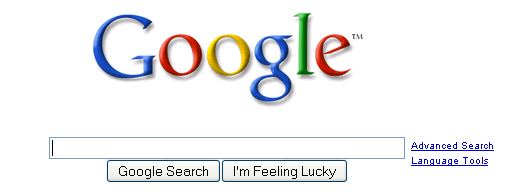Google Patents Web Page Design
Google filed a patent five years ago for its home page design. Yesterday, it was approved.
I’m with Valleywag’s Ryan Tate:
We always thought the page was brain-dead simple, but apparently it’s an innovative “graphical user interface.”
[…]
In other words, subject to how the patent is enforced, Google owns the idea of having a giant search box in the middle of the page, with two big buttons underneath and several small links nearby. Since the time of the patent application in 2004, the company has moved some links, for searching News and Groups and other alternate databases, from directly above the search box to the top of the home page. But Google presumably believes its patent is broad enough to cover the variation.
Mashable’s Barb Dybwad has a similar reaction:
The patent application contains a single illustration of the familiar Google.com user interface which, as we know, is quite spartan. In other words, Google essentially owns the concept of putting a big search box on top of two buttons and putting some text links nearby.
No one knows exactly how or even if Google (Google) plans to use the patent to go after similar interfaces. But if they chose to, at least Yahoo (Yahoo!) and Ask.com would be potential targets. Microsoft’s new Bing (Bing) search might be spared thanks to its background image approach and other interface dissimilarities.
Perhaps more likely, Google’s patent will scare away any new startups brave enough to enter the search space against existing towering giants in the first place. They might think twice about borrowing the “keep it simple, stupid” approach of Google.com.
How in the world can this be patentable?
Techgeist’s Michael Klurfeld has a benign theory of what Google is after:
I think Google filed this patent over liability concerns. The Google homepage is certainly iconic. I doubt there’s anyone who’s been online for an extended period of time who doesn’t recognize the image. Let’s say I’ve been around online for a while, but I’m not all too… perceptive. I could go to some malicious site posing as the Google homepage which steals my data. It could actually say “Goagle,” but I may not have noticed. Google then has a legal basis by which to shut down the owners of that webpage.
IANAL but it strikes me that a trademark would cover that sort of thing. A patent implies something novel and non-obvious. A search bar with two buttons? Not so much.







You know “design patents” are fundimentally different that regular, innovation, patents, right?
http://en.wikipedia.org/wiki/Design_patent
Coke has/had a design patent on their bottle, but not on swirly bottles.
I was advised once, in my 1-day junior college intellectual property (IP) course (making me an expert) that design patents were the weakest sort of IP but also the easiest to get (fewest qualifiers), so go ahead when you can.
BTW, in terms of prior art, here’s the Internet Archive for the Alta Vista page:
(I can’t get it, the Internet Archive is too slow right now … maybe too many people running over there looking for prior-art.)
and Alta Vista today:
http://www.altavista.com/
Against Intellectual Monopoly by Michele Boldrin and David K. Levine. It is of course downloadable at no charge.
The patent office, especially when it comes to anything that has to do with software, is nothing but a for-profit branch of the government. They completely ignore the “novel and non-obvious” qualifier.
Next thing you know they’ll try and patent kowtowing to the Chinese government, and then the trouble will really start.